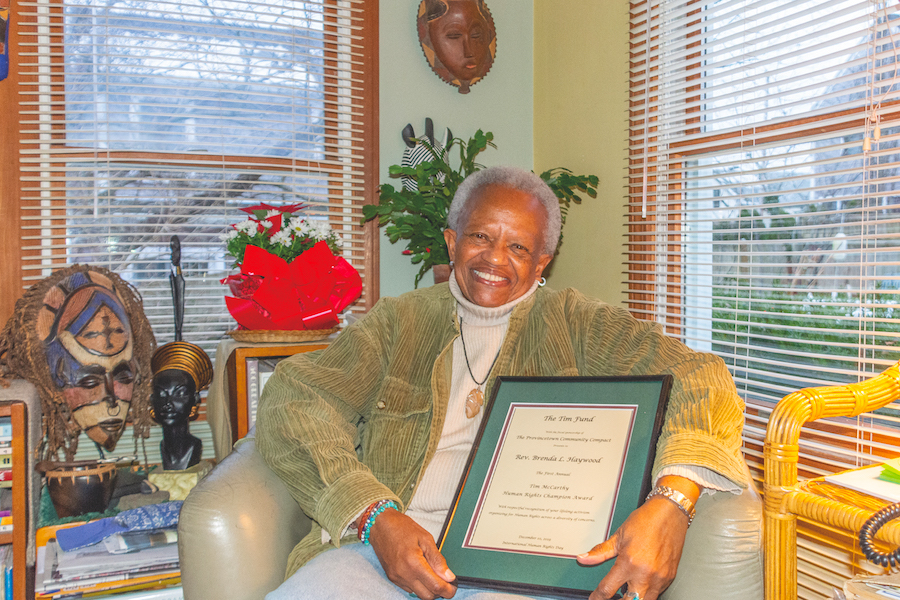PROVINCETOWN — The Rev. Brenda Haywood received the Tim McCarthy Human Rights Champion Award on Dec. 10. This week, she welcomed a reporter to her home to talk about that turn of events, which, she said, “overwhelmed and surprised” her.

It seems it would be hard to find anyone else who would find the choice of Rev. Haywood a surprise.
“Everyone knows her and her long track record of engagement,” said Dr. Brian O’Malley, who helped establish the Tim Fund, which is behind the award. “She’s been there in a very selfless kind of way,” he said.
Presented for the first time this year, the award, which comes with a prize of $2,000, was created in memory of the social activist Tim McCarthy, who died in 2018. McCarthy was a videographer whose earliest work focused on the response of ACT UP to the AIDS crisis. O’Malley said the prize is meant to inspire others who share McCarthy’s “fierce activism, commitment, and passion for human and civil rights.”
A Legacy of Activism
Haywood, who came to Provincetown 30 years ago and has served as a minister at the Unitarian Universalist Church, has long studied white privilege and Native and black history.
She told the Independent that her understanding of social justice began in childhood, when she lived in an area of Newton that was established by Cherokee and black people. There, she was educated in black and Native history and taught lifelong lessons about being kind to her neighbors.
One of those lessons came the hard way. During World War II, as Haywood and her friends walked to school, they passed a shop owned by a Chinese family. “Thinking we were patriotic, we asked them to leave,” she said. In the small community, everyone soon heard about the encounter. “We were sent home from school,” she said.
The adults saw to it that the children’s awareness was raised. “We wrote letters of apology and worked at the store every day for a month,” she said. “While we worked, we exchanged our history of immigration with theirs and built long-lasting friendships. That incident has never left me.”
She founded Racial Justice Provincetown and a diversity program at the Provincetown Schools.
Working with students has been, Haywood said, “an incredible journey. They understand reaching out to another person regardless of color or nationality. They don’t hide their compassion and love.”
Haywood’s human rights work has extended well beyond Provincetown. She served on the Barnstable County Human Rights Advisory Commission, where she initiated discussions about racism on public transit on Cape Cod. Those led to a rewrite of the Regional Transit Authority’s passenger code of conduct, she said. She has also participated in several Habitat for Humanity projects, both on Cape and farther afield in South Dakota and Kenya.
Haywood’s work continues today. She is currently planning a food festival and community homecoming to celebrate immigrants and their stories on Cape Cod. “It’s so important for me to keep going,” she said. “It’s a way of thanking my mentors who were here for me, individuals who inspired me. I give, and in turn, I receive.”
HRAC Revitalized
Haywood received the McCarthy Award at a Cape Cod Human Rights Advisory Commission (HRAC) breakfast celebrating World Human Rights Day on Dec. 10. The Barnstable Community Innovation School and Cape Cod People Against the Trafficking of Humans (PATH) were also awarded prizes for their work.
For Alan Milstead, chair of the HRAC, Haywood’s presence had a special significance. After Haywood’s time on the commission, he said, its budget was cut severely. It has recently made a comeback, he explained, so “it was a wonderful synergy, with Brenda coming back for the breakfast.”
The county’s HRAC was established in 2005, according to O’Malley, who represents Provincetown on the Barnstable County Assembly of Delegates and is the assembly’s liaison to the commission. In 2013, O’Malley said, former Barnstable County Commissioner Leo Cakounes “felt human rights was not an appropriate function and took it out of the budget.”
Nauset Regional High School teacher Lisa Brown, who served on the HRAC for four years, told the Independent that the budget cuts were a real challenge. “For three years, we struggled without funds at all,” she said. “That was pretty tough.”
Given her work with students, Brenda Haywood would likely applaud the fact that it was after a presentation by high school students that the county recently rethought its decision.
The HRAC was reconstituted six months ago and, according to Milstead, will gain a full complement of members by early 2020. The commission is now in the process of recruiting a new coordinator.
